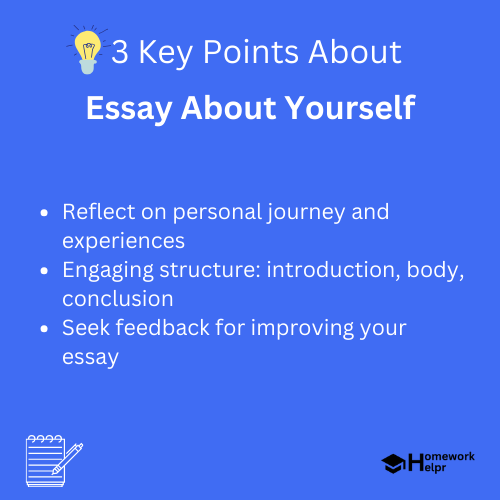📝 Summary
Writing an essay about yourself is a valuable exercise in self-reflection and expression. It provides insight into your character, values, and aspirations, allowing you to connect with your audience. A well-structured essay includes an engaging introduction, a body that outlines your background, interests, achievements, and challenges, and a reflective conclusion on your future goals. Utilize engaging language and seek feedback to enhance the overall quality of your essay. Ultimately, this process helps to articulate your unique identity and the journey that defines you.
Essay About Yourself: A Guide for Students and Children
Writing an essay about yourself can be a challenging yet enlightening experience. It allows you to reflect on your personal journey, understand who you are, and share that with others. This essay is not merely about listing facts; it encapsulates your identity, values, and aspirations. In this article, we’ll explore how to structure such an essay, its essential components, and tips for making it engaging for your readers.
Understanding the Purpose of the Essay
The primary purpose of writing an essay about yourself is to provide insight into your character and experiences. This essay can serve various functions, such as:
- Self-Reflection: Understand your strengths, weaknesses, and growth over time.
- Introduction to Others: Whether in a school setting or a personal blog, it helps others know you better.
- Application Essence: Often used in college or scholarship applications to gauge your uniqueness.
Focusing on these purposes will guide your writing and enhance your ability to connect with your audience.
Definition
Self-Reflection: The careful examination of one’s thoughts and feelings, often leading to personal growth.
Choosing the Structure of Your Essay
A well-structured essay typically consists of three main parts: the introduction, body, and conclusion. Let‚’ delve into each section:
1. Introduction
The introduction of your essay creates the first impression. It should be captivating enough to draw your reader in. You may start with an interesting hook, a quote, or a personal anecdote about a significant moment in your life. Here is where you also share the main idea or theme of your essay.
Examples
For instance, if music played a cornerstone role in your life, you could begin by discussing your first memory with music, maybe singing with your family around the holidays.
2. Body
The body of your essay should consist of several paragraphs that expand on different aspects of your life. Here are some components you might consider including:
- Background: Describe where you come from, your family, and your background.
- Interests: Discuss your hobbies, interests, or passions.
- Achievements: Don’t hesitate to include some of your achievements—academic, personal, or extracurricular.
- Challenges: Talk about any challenges you have faced and how they have helped shape who you are today.
Remember to use transition sentences between paragraphs to maintain a logical flow.
Definition
Transition Sentences: These are phrases or sentences used to connect one idea to another, creating a smooth flow in writing.
3. Conclusion
Your conclusion should summarize your main points and reflect on your future ambitions or goals. It serves as the wrapping up of your thoughts, leaving a lasting impression on the reader.
Examples
For example, you might close your essay by stating your goals‚Äîwhether it‚’ pursuing a specific career or making a difference in your community.
Reflecting on Your Life’s Journey
When writing about yourself, it‚’ vital to reflect deeply on your life’s journey. Think about defining moments that played a significant role in shaping your character. Questions to ponder include:
- What was a challenge that taught you a valuable lesson?
- Who has been your greatest influence and why?
- What are some key values you hold dear?
❓Did You Know?
Did you know that the world’s longest essay ever written was over 1.5 million words long? It was authored by a man named Edward Witten!
Using Engaging Language
The way you choose to express your thoughts can significantly impact your essay‚’ effectiveness. Aim for an engaging, yet authentic tone. Some tips include:
- Use descriptive language to paint a vivid picture.
- Incorporate personal anecdotes to illustrate points.
- Vary sentence lengths for better readability.
Try to connect emotionally; a well-told story can resonate with the reader long after they’ve finished reading.
Seeking Feedback
Before submitting your essay, it’s a good idea to seek feedback from trusted peers, family, or teachers. They can provide valuable insights that might help improve your writing and clarify any confusing portions. Feedback can enhance the overall quality of your essay, ensuring it accurately reflects who you are.

Editing and Revising Your Essay
Once you have a complete draft, the next step is to edit and revise. Here are some areas to focus on:
- Grammar and Spelling: Ensure there are no errors.
- Clarity: Are your ideas clearly expressed?
- Consistency: Is your tone and tense consistent throughout?
Taking time to revise can elevate your essay from good to great, ensuring your true self shines through.
Conclusion
Writing an essay about yourself is an invaluable exercise in self-exploration and expression. By following the structure outlined in this article, using engaging language, and seeking feedback, you can craft an essay that not only represents you well but also leaves a lasting impression on your readers. Remember, your story matters—so share it with confidence!
Related Questions on Essay About Yourself Students and Children
What is the purpose of writing an essay about yourself?
Answer: It helps provide insight into your character.
How should I structure my essay?
Answer: Write an introduction, body, and conclusion.
Why is feedback important when writing?
Answer: Feedback can improve clarity and overall quality.
What tone should I aim for in my essay?
Answer: Aim for an engaging and authentic tone.
